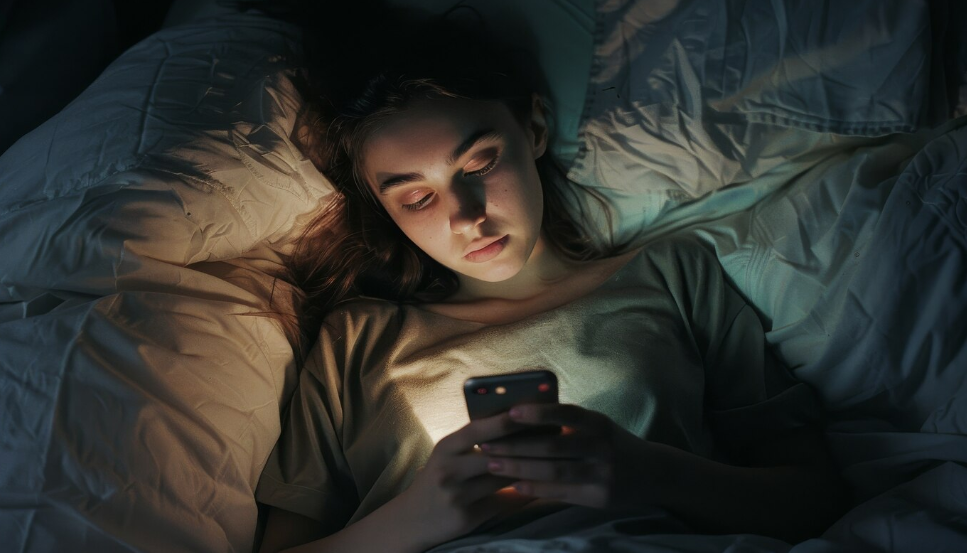Let’s be honest – we’ve all been there. You crawl into bed after a long day, promising yourself you’ll get a solid eight hours of sleep this time. You close your eyes, and… nothing. Your mind starts racing about tomorrow’s meeting, that text you forgot to send, or why your neighbor’s dog seems to bark specifically at 2 AM.
Sound familiar? If you’re nodding along (probably while scrolling through your phone at 11 PM), you’re not alone. Millions of people struggle with winding down at night, and sometimes it’s not because of stress or anxiety – it’s because we’re unknowingly sabotaging our own sleep routine.
The thirty minutes before bed are like the opening credits of a movie. They set the tone for what’s coming next. Yet most of us treat this crucial window like a free-for-all, doing whatever feels convenient in the moment. Today, we’re diving into five surprisingly common evening habits that might be standing between you and that elusive good night’s rest.
1. Doom-Scrolling Through Your Phone (Yes, Even “Just for Five Minutes”)
Picture this: You’re in bed, lights dimmed, ready to sleep. But first, let me just check Instagram real quick. One scroll turns into thirty, and suddenly you’re deep in a rabbit hole watching someone’s aunt’s friend’s wedding highlights from 2019.
We all know phones emit blue light, but there’s more to it than just the scientific stuff. Your brain interprets that bright screen as daylight, essentially telling your body, “Hey, it’s daytime! Stay alert!” It’s like having a tiny sun in your hands right before trying to convince your brain it’s time to power down.
But here’s the thing that really gets you – it’s not just the light. The content itself can be a problem. Social media is designed to keep you engaged, showing you just enough interesting content to make you think, “Okay, one more scroll.” Before you know it, you’ve seen your ex’s vacation photos, read three different political arguments, and somehow ended up on a page about why cats knock things off tables.
The evening alternative: Try charging your phone in another room, or at least across the bedroom where you’d have to get up to reach it. If you absolutely must have it nearby for emergencies, put it in airplane mode or use a “Do Not Disturb” setting. Replace the scrolling with something that actually helps you unwind – maybe a book, some light stretching, or even just lying there thinking about your day.
2. Binge-Watching That “Just One More Episode” Series
Netflix and chill? More like Netflix and struggle to fall asleep for the next three hours. Streaming platforms have mastered the art of the cliffhanger, making it nearly impossible to stop at just one episode. They know exactly how to hook you with that “Previously on…” recap followed by an intense opening scene.
The problem isn’t necessarily the TV itself – it’s the mental stimulation. Your favorite thriller might be incredibly entertaining, but it’s also keeping your brain in an active, engaged state when you should be transitioning to rest mode. Plus, if you’re watching on a tablet or laptop in bed, you’re back to that blue light issue we just talked about.
Let’s say you start watching at 9 PM with the best intentions. “I’ll watch one episode and then go to sleep,” you tell yourself. But then the episode ends on a cliffhanger – will Jim finally tell Pam how he feels? You click “next episode” almost reflexively. Two hours later, you’re emotionally invested in plotlines you didn’t even care about that morning, and your brain is buzzing with excitement, romance, drama, or whatever genre rabbit hole you fell into.
The evening alternative: Set a strict cutoff time for screens – maybe 9 PM or an hour before you want to be asleep. If you’re really committed to your show, watch it earlier in the evening. For your pre-sleep entertainment, consider podcasts with calm, interesting content, audiobooks, or even old radio shows. Your brain gets the entertainment without the visual stimulation.
3. Having Deep Conversations or Making Big Decisions
This one might surprise you, but think about it – how many times have you had an intense conversation with your partner, roommate, or family member right before bed? Maybe you finally decided to address that thing that’s been bothering you, or perhaps someone else brought up a heavy topic.
Whether it’s relationship talks, planning major life decisions, or even just rehashing family drama, these conversations can leave your mind spinning long after the lights go out. Your brain doesn’t have an off switch – if you’ve just spent an hour discussing whether to move to a new city or working through a disagreement, those thoughts don’t magically disappear when your head hits the pillow.
The same goes for making big decisions alone. Late-night planning sessions might seem productive – after all, the house is quiet, and you have time to think. But decision-making requires mental energy and can trigger anxiety about outcomes. Should I take that job? Should I break up with him? Should I buy that house? These aren’t the thoughts you want swirling around when you’re trying to drift off.
The evening alternative: Save important conversations for earlier in the day, or at least earlier in the evening. If something urgent comes up, acknowledge it but suggest tabling it for tomorrow when you’re both fresh. For decision-making, keep a notepad by your bed to jot down thoughts that pop up, then tell yourself you’ll address them tomorrow.
4. Working Out or Getting Your Heart Rate Up
You might think this one’s obvious, but you’d be surprised how many people squeeze in late-night workouts. Maybe your schedule only allows for evening gym sessions, or perhaps you decided to tackle that home workout video after dinner. While exercise is fantastic for overall wellness and can help with sleep quality in general, timing matters.
Physical activity raises your core body temperature and gets your heart pumping – essentially the opposite of what your body needs to prepare for sleep. Your body naturally cools down in the evening as part of its circadian rhythm, and a workout can disrupt this process.
It’s not just traditional exercise either. Maybe you decided to deep-clean your kitchen, rearrange furniture, or tackle a physical project around the house. Any activity that gets your heart rate up and requires significant physical or mental energy can have the same effect as a workout.
The evening alternative: Try to finish workouts at least 3-4 hours before bedtime. If your schedule absolutely requires evening exercise, focus on gentler activities like yoga, stretching, or a leisurely walk. These can actually help you unwind rather than rev up.
5. Eating Heavy Meals or Drinking Caffeine
Okay, this one might seem obvious with the caffeine part, but let’s talk about why these evening consumption habits can derail your sleep – and it’s not always for the reasons you think.
First, the coffee thing. We all know caffeine is a stimulant, but many people underestimate how long it stays in your system. That afternoon coffee at 3 PM? It could still be affecting you at bedtime. But here’s what many don’t realize – it’s not just coffee. Tea (even some herbal teas), chocolate, some sodas, and even certain medications contain caffeine.
Now for the food part. A big meal close to bedtime puts your digestive system to work when your body should be winding down. But it’s not just about digestion – certain foods can actually make you feel more alert. Spicy foods, for instance, can raise your body temperature. High-sugar foods can cause energy spikes and crashes. Even drinking too much water can disrupt sleep with bathroom trips.
The evening alternative: Try to finish eating at least 2-3 hours before bed. If you’re genuinely hungry, opt for a light snack like a banana, a small handful of nuts, or some herbal tea (caffeine-free, of course). Create a cutoff time for caffeine that works for you – many people find stopping after 2 PM helps.
The 30-Minute Wind-Down: What To Do Instead
So what should you do in those crucial thirty minutes before sleep? Think of it as creating a personal ritual that signals to your brain: “Hey, it’s time to start shutting down.”
Some ideas to experiment with:
- Reading a physical book (preferably fiction that won’t keep you up wondering about cliffhangers)
- Gentle stretching or restorative yoga poses
- Writing in a journal – not planning tomorrow, but reflecting on today
- Listen to calming music or nature sounds
- Practice simple breathing exercises
- Prepare things for tomorrow (lay out clothes, pack your bag) to clear your mind
- Take a warm bath or shower
The key is finding what works for you and sticking with it. Consistency helps your body recognize the routine and start preparing for sleep.
Creating Your Personal Evening Routine
Remember, everyone’s different. What works for your friend might not work for you, and that’s perfectly normal. Maybe you’re someone who falls asleep easily regardless of what you do, or maybe you need a strict routine to function. The goal isn’t to follow rules perfectly – it’s to pay attention to what actually helps you feel rested.
Start by tracking your evening habits for a week. Notice what you do in that pre-sleep window and how well you sleep afterward. You might discover patterns you hadn’t noticed before. Maybe you sleep better on nights when you read versus nights when you watch TV. Or perhaps you’ve realized that your “quick” phone check consistently turns into an hour-long session.
Small changes can make a surprising difference. You don’t have to overhaul your entire evening routine overnight. Pick one habit to modify and see how it goes. Maybe this week, you charge your phone in the kitchen instead of on your nightstand. Next week, you might try swapping your evening workout for morning exercise.
Your evening routine is more than just what you do before bed – it’s how you transition from the busy, stimulating day to peaceful rest. Those thirty minutes before sleep are a gift you give yourself, a chance to decompress and prepare your mind and body for restoration.
Sure, we all have nights where we break our own rules. Life happens, work runs late, or sometimes you just really want to know what happens next in your show. That’s human. The goal isn’t perfection; it’s awareness and intentionality about the choices that affect how you feel the next day.
Your future well-rested self will thank you for the small changes you make today. Sweet dreams!

Disclaimer: This article is for informational purposes only and should not be considered professional medical advice, diagnosis, or treatment. The suggestions provided are general lifestyle tips based on common sleep hygiene practices. Individual sleep needs and challenges vary greatly. If you have persistent sleep difficulties or concerns about your sleep patterns, please consult with a qualified healthcare professional. The author and website are not responsible for any consequences that may result from following the suggestions in this article.
Sources: Content based on general sleep hygiene principles widely discussed in lifestyle and wellness publications, including information commonly found on sleep education websites, wellness blogs, and lifestyle publications focused on healthy habits.



